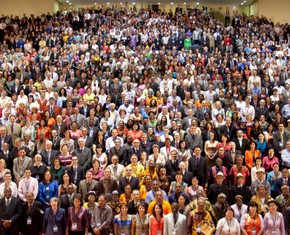The views expressed in our content reflect individual perspectives and do not represent the authoritative views of the Baha'i Faith.
When you participate in a Baha’i study circle, you commence a journey through a curriculum of study materials, starting with the first Institute book, “Reflections on the Life of the Spirit.”
In that book, you’ll collaborate with a group and a tutor studying three important spiritual aspects: understanding the Baha’i writings; prayer; and life after death. You’ll explore mystical, beautiful and powerful Baha’i writings like this one:
Know thou that the soul of man is exalted above, and is independent of all infirmities of body or mind. That a sick person showeth signs of weakness is due to the hindrances that interpose themselves between his soul and his body, for the soul itself remaineth unaffected by any bodily ailments. Consider the light of the lamp. Though an external object may interfere with its radiance, the light itself continueth to shine with undiminished power. In like manner, every malady afflicting the body of man is an impediment that preventeth the soul from manifesting its inherent might and power. When it leaveth the body, however, it will evince such ascendancy, and reveal such influence as no force on earth can equal. Every pure, every refined and sanctified soul will be endowed with tremendous power, and shall rejoice with exceeding gladness. – Baha’u’llah, Gleanings from the Writings of Baha’u’llah, pp. 153-154.
What is the Study Circle Learning Curriculum?
Overall, the study circle curriculum comprises a series of ten institute books that reflect on core Baha’i teachings.
In the initial section of the first institute book “Understanding the Baha’i Writings,” participants read some of the writings of Baha’u’llah and ponder the meanings discovered within them. In a “Book One” study circle, people begin reading and comprehending those writings in a small way, improving comprehension skills to seek out spiritual concepts and meaning from the entire ocean of Baha’u’llah’s writings.
As the participants learn to understand the Baha’i writings, the tutor asks them to think deeply about the meanings within and how to apply them to their lives. Participants read a series of quotations and explore their meanings, for example:
The betterment of the world can be accomplished through pure and goodly deeds, through commendable and seemly conduct. – Baha’u’llah, quoted by Shoghi Effendi in The Advent of Divine Justice, pp. 24-25.
The Baha’i quotes included in the study circle books deal with profound issues, offering spiritual solutions affecting the spiritual core of everyone in the community. One implicit premise within Baha’u’llah’s writings is that the capacity to change is in our hands.
The second unit in Book One, “Prayer,” helps participants clarify the concept of prayer and of its importance. Ensuing discussions often explore the Baha’i view that prayer is an essential element of life. But Baha’is look at prayer in a non-traditional way—rather than an outdated custom, where the individual’s role is to participate in rote prayer as a member of a passive congregation who allow clergy to lead them, the Baha’i teachings encourage individual communion with God.
That means those involved in study circles work individually at adjusting their hearts and minds so they enter a spiritual condition appropriate for the state of prayer. This is how Baha’is work at awakening the desire to converse with God and to feel the joy of nearness to God. Participants are encouraged to develop a daily spiritual habit of praying to nurture our inner selves.
The third unit of Book One, “Life after Death,” helps participants appreciate that their path of spiritual growth needs to be understood in the fullest context of life—which extends beyond our earthly existence and continues forever as our souls progress. Some of the questions and exercises in this part of Book One address abstract concepts where there are no concrete answers, which makes for interesting and lively discussions.
At this point in their study, participants start to understand that they have the responsibility of becoming active owners of their learning, not just the passive receivers of information delivered by others. People who learn in Baha’i study groups gain an understanding that they are acquiring significant skills that effect their spirits, thus enabling them to be better equipped to continue an eternal spiritual journey.
















Comments
Sign in or create an account
Continue with Googleor